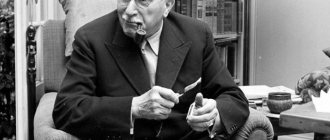In this article we will tell you:
- Stages of personality self-knowledge.
- Primary and secondary self-knowledge of a person.
- Types and age stages of self-knowledge.
- 2 simple and effective exercises for training self-knowledge.
- Valuable results of human self-knowledge.
The process of self-discovery is a path that few choose. It requires some effort, work on oneself, honesty and sincerity, interest, passion, curiosity, and openness. Starting in childhood, it can last a lifetime. The gifts from him are truly wonderful: he is a holistic person who feels harmony both inside and outside.
Next, you will learn about the nature of self-knowledge, what types it is and what stages it usually consists of. We will also share practical methods, using which you can get valuable results of self-knowledge, discovering yourself from a new side.
Self-knowledge
The process of knowing yourself is called self-knowledge. It is formed throughout life, transforming depending on circumstances. A person’s self-knowledge is influenced by various factors, such as a person’s social status, his social roles, character and temperament, creative and physical abilities, and much more.
Personality formation occurs throughout life. A person is born, begins to explore the outside world and comes to realize himself as a separate person. In infancy, the child becomes aware of and accepts himself through his mother. Subsequently, he begins to understand that he is a separate person from her, begins to learn to accept and study himself, his body, behavior, and the reaction of others to him.
Psychologists argue that the influence of various factors on the process of self-knowledge is irreversible. Therefore, the more positive examples a child sees in childhood, the more thorough the process of self-knowledge will take place in his life.
Psychological dependence on various circumstances may also be associated with some difficulties in childhood.
With the process of personality formation, a person begins to understand what surrounds him, what reality he is in, how society influences him and how he himself influences social processes.
Self-knowledge and personality development
In order for a person to realize himself in life, it is very important to realize his purpose and place. Personal self-knowledge provides a person with potential success. His self-realization and future activities depend on how deeply he knows himself.
People who cannot find their place in life are usually very critical, distrustful and picky. In order to learn to look at the world realistically, you must first learn to see yourself. To achieve maximum opportunities in his life, a person must know himself.
Self-knowledge and self-development are inextricably linked. As a person develops, he comes to know himself. By getting to know oneself, a person develops. These two factors always go hand in hand. It is impossible to develop without knowing your preferences, capabilities, and talents. Self-knowledge of a person forms a certain range of interests and possible areas of human activity.
Many people already know in childhood what they want to become when they grow up. This process of self-discovery is not available to everyone. Scientists still cannot answer the question of why some children are confident in their future, while others are not. Perhaps the parents' potential and their positive attitude play a role. The process of self-knowledge greatly depends on the upbringing of a child.
Some psychologists argue that the process of self-knowledge is shaped by a person's ability to develop as a person. A number of factors influencing this process determine the success of personality development; by recognizing one’s inner world, temperament, becoming familiar with one’s distinctive features and capabilities, a person begins to accept himself as he is. This has a big role in the process of self-realization.
Depending on the type and way of thinking, a person receives a certain number of qualities that he will possess in life. Self-development will also depend on this. In addition, self-confidence plays a big role here. A complex person will be less in demand in society, despite his skills and talents. He will not be able to express himself the way he himself would like. Therefore, the processes of self-realization and self-knowledge are also interconnected.
Self-knowledge and self-development are not only interconnected, they complement each other. Development and progress are impossible if you are not aware of your belonging, distinctive features and qualities. A person develops by learning new things about himself, thereby using his new qualities to his advantage. In the process of self-discovery, people begin to realize their importance, thereby receiving more opportunities for development. A person who develops, grows above himself, becomes wiser, more experienced and more in demand in any field.
The relationship of concepts in the cultural-historical approach
The cultural-historical approach of L. S. Vygotsky, which is actively developing in Russian psychology, assumes the closest and most active connection between socialization and self-realization. Socialization is considered by Vygotsky more broadly; it is not only the assimilation of social attitudes, but also of the entire cultural and historical experience, the heritage of the environment, which is expressed primarily in the semantics of language.
Language is positioned as a universal tool, a psychological means for perceiving and mediating the world, both external and internal. Language is not just a system of signs for designating objects, it is a system of symbols and meanings, which is unique to each cultural reality and develops in the process of history.
By socializing, i.e. perceiving the established ways of interaction of the individual with reality, both objective and linguistic, the individual not only perceives culture, it grows into itself a structure of activity, which becomes its own structure of higher mental functions, after which it implements this structure by influencing the outside world.
Note 1
Thus, socialization and self-realization form a dialectical spiral - having assimilated social content within the framework of socialization, the subject processes and internalizes it, after which it self-realizes, transforming the external world in accordance with its internal conditions.
Types of self-knowledge
The formation of personality undergoes changes throughout a person’s life. There are several types of self-knowledge that play a huge role in interpersonal and intrapersonal interaction. Types of self-knowledge differ depending on personal processes. The order of these processes is determined by various factors: analysis of one’s own self, acceptance of oneself as an individual, assessment of one’s capabilities and abilities.
Knowing some basics of his behavior and the behavior of others, it will be easier for a person to develop, since he will understand many behavioral points. There are a number of ways to help you engage in self-knowledge consciously.
- Introspection. A person deliberately fixes his view on behavior, observes his own reactions to various events, tracks his views and their dependence on various factors. As a result of analyzing one’s own personality, a person receives a holistic view of the world and compares it with his own feelings.
- Introspection. This process is closely related to self-observation. After analyzing some points, you can really assess your capabilities and behavioral reactions that arise in the processes of reaction to various factors.
- Comparing yourself with other people. By comparing your own behavior and the behavior of people around you, you can soberly assess many situations and work to correct your own mistakes. This process will definitely be the result of successful cooperation. After carefully studying your own reactions and the reactions of others, you can learn to interact successfully with them.
- Personality modeling. Using your own knowledge about personality, you can control and regulate many psychological reactions. Understanding the importance of self-control, a number of ideas about one’s own personality and the world around them are formed.
In the process of self-knowledge, a person begins to realize his essence, belonging and the meaning of his own existence. The result of self-knowledge is acceptance of oneself as an individual and the ability to find positive traits even in one’s shortcomings.
In addition to the fact that there are methods of self-knowledge, there are also means of self-knowledge with the help of which a person can more easily go through the path of self-recognition.
- Report to yourself. It consists of a written or oral daily report about the day passed, what was seen during the day, and one’s behavior. Even small moments must be recorded. Currently, blogs that are maintained on the Internet are very popular. They can record all the events that happened during the day. If a person does not want to flaunt his life, you can use a diary, which will record important events that happen in life.
- Psychological literature and cinema. There are a lot of useful documentaries about self-knowledge, as well as professional literature, with the help of which it will be easier to understand your worldview and accept yourself as an individual. By comparing yourself with movie characters or book characters, you can gain new knowledge about yourself.
- Psychological tests. They help people choose the direction of their talents, highlight their temperament and obvious character traits. With their help, you can understand your belonging to a particular profession or your inclination towards a particular activity. Many companies offer to take not only professional tests, but also tests to study self-realization and personal growth. It will be much easier for a trained person to deal with different situations by first studying similar works.
In addition, you can always turn to a psychologist who, using special methods, will help each person gain knowledge about himself, help set priorities and determine the functions of self-knowledge for each person. Psychological counseling is very developed in most European countries. In Russia, psychological counseling centers have also recently begun to develop extensively, where everyone can get answers to their questions, including advice on self-knowledge.
Trainings are conducted both individually and in groups. Depending on the wishes and capabilities of the person, you can choose the appropriate method for yourself. Not all people can cope with this issue on their own, so they often seek advice from a specialist. The right solution to a problem cannot always be found on your own, so there is nothing special about getting help from a specialist.
Psychology of self-development
A person open to self-development is a scientist who, when faced with a problem, collects facts, forms hypotheses, and acts to make them reality.
The psychology of personal self-development has two directions:
- External. Aims at the chosen activity and its improvement. These are goal setting, plan development, motivation and control.
- Internal. Development of the inner world, analysis and introspection of events, assessment and improvement.
Progress in self-development is observed when a person:
- focuses on universal human values, strives to accumulate knowledge in order to be useful to society (it is useless to accumulate knowledge solely for oneself);
- knows how to plan and act according to the plan;
- able to mobilize oneself and overcome difficulties;
- evaluates own strengths and weaknesses, realizes readiness for new activities.
Self-development in psychology is purposeful actions focused on changing reality, the picture of the world and oneself through the choice of goals, means of achieving them, and life principles.
What prevents you from developing? Fear of responsibility, laziness, egocentrism, victim position. These qualities need to be replaced with those that will contribute to self-improvement:
- Mindfulness. This is the ability to experience current emotions without delving into the experiences of the past or future.
- Cognition. This is what makes a person human. It is defined in the ability not only to sense, but also to perceive, think, and remember.
- Action. Choosing an activity in which you would like to improve your skills and abilities, setting goals and objectives.
- Life ideals (ideas). These are the highest goals set for oneself as an individual and for society.
- Responsibility. The ability to accept the fact that what is happening around is the result of one’s own actions or lack thereof.
Don't forget about health. Illness, weakness and fatigue interfere with self-development, so you need to lead a correct lifestyle and maintain the performance of the body.
Motivation
In the psychology of self-development, motivation is the fuel for actions and decisions. Many people spend time looking for a motive, a reason, an argument, a “kick.” However, everyone has motivation, but with the wrong vector. It is enough to change the minus to a plus.
Motives can be internal (success at work, the need to study), or external (prestigious car, high earnings). But this is not the driving force or barrier to action. There are people focused on success and failure. "I knew it! I can't do anything. This is my destiny." To refocus on success, you need to perceive failure as a challenge:
- reconsider goals, split them into smaller ones;
- take into account risks, create plan options;
- find partners;
- constantly learn, expand the arsenal of means to achieve goals.
Responding constructively to failure is a source of motivation.
Result
Carl Rogers' theory in psychology defines self-development as a person's realization of his potential. This is the desire to become a fully functioning person, whose life is filled with meaning, search and excitement. It is believed that self-development is available only in the spiritual sense as the highest level of need. This is far from true. Self-development occurs at any stage, in any activity.
How to achieve results? Set a goal. It must be on a plane that resonates in the inner world, allows it to develop externally, is embodied in action, in practice, and forms the social role of a person.
Self-development plan
Adaptation occurs only when there is a need for it. Therefore, self-development, as a conscious activity, arises in response to a specific practical problem. Moreover, it must relate to an area that the person is interested in studying.
The plan in the psychology of self-development for creativity and business is structured like this:
- Select areas for development - topics that are interesting to read and think about.
- Identify the motives (increasing self-esteem, self-respect; self-education, growth of professionalism).
- Set goals. There may be several of them (but within the limits of possibilities).
- Describe your strengths. This is knowledge, capabilities, qualities that will help you achieve your goal.
- Identify risks and disadvantages, things that could interfere.
- Select the skills and knowledge you need to acquire.
- Create a plan for the week. It includes goals, resources to achieve them, possible risks and time for training.
Even if the self-improvement plan is approximate, it can be adjusted along the way.
Ideology and perception
When every step in an activity is devoted to ideas that are important to the individual, then perception will subconsciously be focused on obtaining information in this area.
Ideology is the subordination of activity to principles that correspond to moral, social or aesthetic ideals and point of view. Defending one’s own opinion is what motivates a person and gives strength. Any activity is easier for an ideological person.
Primary self-knowledge
The process of self-discovery begins in infancy. Throughout life, it changes and takes on more and more defined forms. Primary self-knowledge begins to develop in early childhood. Trust in the world and in oneself depends on it.
The very first stage in self-knowledge is primary. The child forms an idea of himself and other people, begins to explore the world, gets acquainted with the reactions of people and with his own. The process of self-knowledge is embedded in the brain. From birth, a person begins to learn to accept himself as he is.
Thanks to properly organized help from parents, the process of primary self-knowledge will be easier. Due to the great influence of parents on their child, part of his ideas about himself and the world around him will be inextricably linked with the parents’ idea of him. As a result of praise or, conversely, conflicts emerging in the family, the child begins to know himself and learns to accept the world.
Despite the fact that primary self-knowledge begins at an early age, the crisis of this stage occurs in more mature years. When encountering any obstacles along the way, a discrepancy with one’s expectations, the changed world begins to seem different from what it was in early childhood. Teenagers often tend to idealize the surrounding reality, however, at some point a crisis occurs. This is called a crisis of primary self-knowledge, when one’s own ideas began to undergo some changes that must be come to terms with.
Without which a healthy lifestyle is impossible
The very concept of a healthy lifestyle is relatively new, it arose in the seventies of the last century and was directly related, on the one hand, to an increase in average life expectancy, and on the other, to the deterioration of the environmental situation in general. Modern man has gained access to a sufficient amount of food and at the same time began to move less, he has less free time and the amount of stress has sharply increased. In this regard, there was a need to create a general concept that would affect all areas of life and allow them to be harmonized so that, as a result, they could live a long, happy and active life.
It should be noted that there is no single and clear definition of a healthy lifestyle, since a general understanding of it has not yet been formed. However, we can list the most common components of a healthy lifestyle.
Conflict with primary self-knowledge
As a result of understanding themselves and the surrounding reality, people usually identify certain factors that subsequently have a great influence on their lives. For example, the attitude of other people towards him is usually of great importance for an individual. The general impression of oneself is formed, among other things, through the views of others on one’s personality.
Methods of self-knowledge involve studying one’s own “I” through the eyes of others. Possessing certain information from other people, a person receives a lot of useful information about his personality, and also forms his own opinion about the reality around him.
A person does not always hear and see what he would like. Therefore, a conflict with primary self-knowledge often arises at this post. People tend to note only positive qualities in themselves, forgetting about some negative aspects.
Physical activity
Absolutely everyone calls it an integral part of a healthy lifestyle. Scientific and technological progress has made human life significantly easier, but at the same time deprived him of the physical activity necessary to maintain all body systems in good shape. A person goes down from his floor and goes up to it by elevator, takes a bus or metro instead of walking, and then sits at a computer for more than nine hours, straining only his eyes. Of course, this rhythm of life contributes to the formation of excess weight, physical inactivity and the development of various diseases. Therefore, a prerequisite for a healthy lifestyle is the need to devote at least thirty minutes a day to physical education and sports, and the more, the better. Moreover, although visiting the gym is desirable, not everyone can afford it in terms of time and finances.
You can ensure daily physical activity in simple and inexpensive ways: change the elevator to walking down and up (at least a couple of floors on foot); five to ten minutes of exercise in the morning; walks from work to home. Finding time for all this is not so difficult.
Ideally, physical activity should be supplemented with regular walks in the fresh air and hardening.
Secondary self-knowledge
The goal of self-knowledge is an in-depth study of one’s own characteristics and using them to one’s own advantage. As a result of the formation of personality, it undergoes some changes, thanks to many factors influencing a person’s life.
Over time, an individual may lose some of his qualities and acquire others. As a result of this process, a partial erasure of ideas about one’s own “I” begins. By undergoing these changes, a person becomes forced to accept the “new” self. After some time, self-acceptance begins through the eyes of others. Very often people see themselves differently from the way their friends and relatives see them. This is also part of self-knowledge. Accepting oneself from different positions plays a huge role in the process of personality development.
In the process of personality formation, there comes a moment when a person seems to know himself and his own reactions to something very well. This period is called secondary self-knowledge. It is formed after a successfully passed crisis of primary self-knowledge. A person begins to realize his own independence, the importance of his judgments and the reaction of others to them.
In order to successfully pass this stage, you only need to be attentive to your own personality while choosing especially important moments.
Rejection of bad habits
This component of a healthy lifestyle is the most obvious. Naturally, alcohol and tobacco abuse can negate all other efforts to achieve well-being and longevity. However, bad habits include not only the two above. There can be an innumerable number of bad habits, for example, biting nails, cracking fingers, scratching, and so on and so forth. Not all bad habits pose a direct threat to health, but getting rid of them can improve your life.











